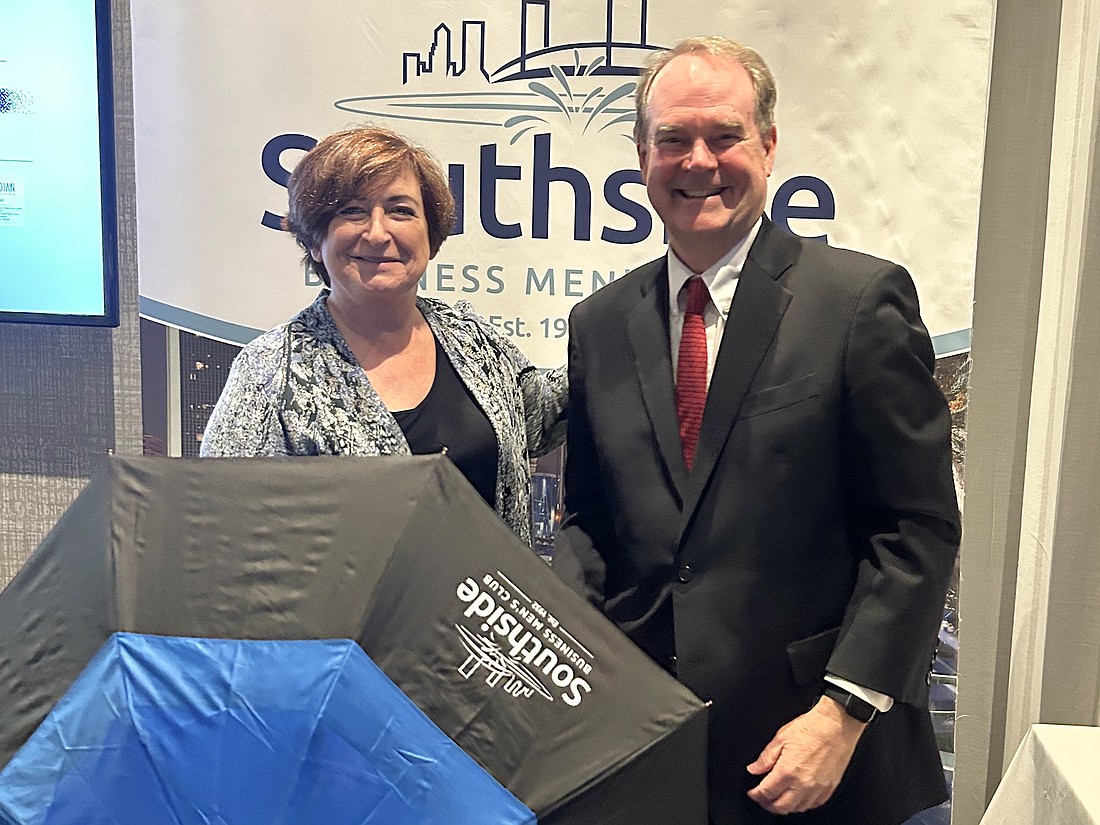
Chief U.S. District Judge Timothy Corrigan closed his May 24 presentation to the Southside Business Men’s Club with a plea for Americans to be more attuned to and aware of the U.S. Constitution.
“Only one out of every four adults know what the three branches of government even are,” he said.
“Only one in three can name any branch.”
Corrigan, who serves in the Middle District of Florida, said “respecting the rights of the Constitution presupposes we know what those rights are.”
President George W. Bush nominated Corrigan in May 2002. The U.S. Senate confirmed him that September.
Corrigan, 67, also has served as a U.S. magistrate judge in the Middle District from 1996-2002.
The Jacksonville native earned his Bachelor of Arts from the University of Notre Dame in 1978 and his Juris Doctor from Duke University School of Law in 1981.
Corrigan clerked for U.S. Circuit Judge Gerald Tjoflat on the U.S. Court of Appeals for the 11th Circuit in 1981 and was in private practice from 1982-96.
The Southside Business Men’s Club met at Fogo de Chao in the St. Johns Town Center area.
Asked to describe his role as a federal judge, Corrigan referenced Article III of the U.S. Constitution, which outlines the judicial branch and powers of the federal, appellate and supreme courts.
Examples of matters he hears include tax fraud, large-scale drug cases, online sex crimes and violent crimes on federal property.
“It has to have some kind of federal connection in order to be a federal situation,” he said.
“Examples of federal civil cases include personal injury cases committed on federal property or by a federal employee.”
Corrigan said he recently tried a case involving an auto accident resulting in an injury because the plaintiff is a U.S. postal worker.
He also referenced the criminal indictment of former JEA CEO Aaron Zahn and CFO Ryan Wannemacher, who are charged with conspiracy and wire fraud. Corrigan could not comment further. U.S. District Judge Brian Davis is presiding over that case.
The Middle District boundaries, set by Congress, has a population of 12.5 million from Jacksonville to Fort Myers.
Justice.gov says the district covers 35 of the state’s 67 counties and is the second-most populous district in the nation. It has offices in Jacksonville, Fort Myers, Ocala, Orlando and Tampa.
Corrigan said population growth has become a challenge.
“It’s left us short of the proper number of judges,” he said.
There are 15 judgeships in the Middle District, one of which is vacant.
There is help from magistrate judges and senior judges, Corrigan said, but 15 judges across five district courthouses aren’t enough.
USCourts.gov explains that Article III judges who have met age and service requirements set by federal statute are eligible to take senior status if they are at least 65 years old and have served at least 15 years on the bench, or any combination of age and years of service that equals 80.
Regardless of age, judges must serve at least 10 years to qualify for senior status.
Upon taking senior status, judges may choose to handle a reduced caseload. The site says senior judges handle about 20% of the total district and appellate caseload.
By taking senior status, even if maintaining a full caseload, a judge creates a vacancy on the court, to be filled by the nomination and confirmation process for Article III judges.
A U.S. magistrate judge is a judicial officer of the district court and is appointed by majority vote of the active district judges of the court to exercise jurisdiction over matters assigned by statute as well as those delegated by the district judges.
Impending judicial vacancies due to age also are a concern. Corrigan said politics and the slow pace to fill those roles are troubling.
“Unless those vacancies get filled we’re going to have 11 or 10” full-time judges, he said.
“It’s going to be very difficult to do the job you pay us to do.”
Corrigan also talked about civility.
He referenced school zones, pulling over for emergency vehicles, stopping for school buses that are picking up and dropping off students, and doing one’s taxes as the types of laws that U.S. citizens comply with regularly.
“It’s the price we pay for living in a civilized society,” he said.
“Adherence to the rule of law is paramount to our American way of life.”
He called the Jan. 6 riot at the U.S. Capitol “an aberration.”
“Even with the trauma, the rule of law held,” he said. “Ultimately the system worked.”
Transgressions on behalf of past presidents, he said, were also held accountable by the rule of law.
Corrgan also spoke about someo of his most bizarre cases.
He said cases from his “funny file” include “bank robbers” who were caught through their own clumsiness.
“I had an accused robber, for example, who appeared before me wearing a T-shirt that read ‘live free or die’ and a baseball cap advertising Skoal tobacco,” he said. “He entered a not guilty plea.”
Corrigan said the prosecutor produced a photo of the accused wearing the same shirt and hat at the scene of the crime caught by bank security.
“These are crimes of convenience and they’re almost always caught,” he said.
Another defendant elected to remove all of his clothes after a bank’s dye pack exploded, hoping to attract less attention. He ended up with fewer clothes but dye stains still visible on his body.
Then there was the robber who demanded money from a teller using his bank deposit slip with his name and account number on it.
“The FBI got to his house before he did,” he said.